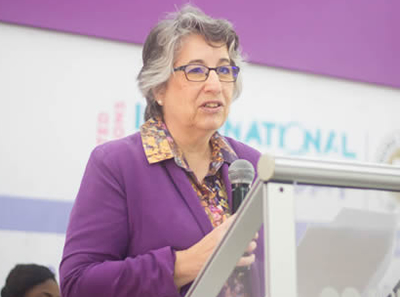UN launches project to improve African peacekeepers technical skills

Dr Christine Evans-Klock, the United Nations Resident Coordinator in Ghana, has unveiled an action project dubbed “Improving Response Capacities to Terrorism in Peacekeeping Theatres in Africa.”
The half a million dollar project seeks to improve the technical skills of African peacekeepers in protecting themselves against attacks through research and training, focusing on Police/Troop Contributing Countries (P/TCC) – Ghana, Togo, Burkina Faso, Senegal, Nigeria, Niger, Guinea and Mali.
The one-year project is being implemented by the Kofi Annan International Peacekeeping Training Centre (KAIPTC) with the support of the UNDP and in partnership with the Government of Japan.
There is an observable rise in the number of peacekeepers killed by terrorists in Mali since 2013.
According to the UN, 146 peacekeepers had been killed by terror attacks in Mali alone since 2013, raising questions about the levels of preparedness of African peacekeepers for terrorism prevention.
An area that the P/TCC would focus its attention on is to review their respective pre-deployment training packages for their peacekeepers to ensure that appropriate training on terrorism prevention was given to peacekeepers prior to deployment.
Dr Evans-Klock said the project aimed at improving the capability of UN peacekeepers on how to carry out their critical responsibilities under the growing threats of terrorism and how best to protect themselves in hostile areas.
She said the project would use research findings on the causes of increasing casualties to design effective pre-deployment training, integrating how peacekeepers could protect themselves against targeted attacks into their training curriculum.
She recounted that the UN in partnership with Japan developed a toolkit, which was launched in April, for local communities to use to ward off extremism.
She said the purpose of the toolkit was to enable civil society groups at the local level share information about innovative practices they had developed to tackle extremism.
Madam Gita Welch, UNDP Country Director, acknowledged the Government of Japan’s critical role in strengthening peace and security and particularly to address terrorism in West Africa and said the project was a priority for the UNDP as they recognised the inextricable nexus between peace and development.
“We realise that the 2030 Agenda for Sustainable Development cannot be achieved without peace. Sustainable Development Goal (SDG) 16 explicitly commits UN member states to build peaceful, just and inclusive societies by addressing factors which give rise to violence and insecurity,” Madam Welch stated.
“As a global challenge, terrorism is arguably the greatest security threat to our collective effort toward sustainable human development. If not addressed, it will reverse Africa’s development gains for decades to come,” she added.
Air Vice Marshal Griffith S. Evans, the Commandant, KAIPTC, said as a Centre the trust of their mandate was to support regional efforts in capacity development in the peace and security sector through training, research and education.
He said international peacekeeping remains the most potent tool often used by the UN in to manage conflicts around the world.
Mr John Pokoo, the Head of Conflict Management Programme, Faculty of Academic Affairs and Research, KAIPTC, said the project would produce a scoping study report on terrorism-related training gaps for P/TCCs participating in it.
He said it would also produce a guide for developing/strengthening counter-terrorism component of the pre-deployment training of peacekeepers by the participating P/TCCs.
He said under the project, they would train up to 100 personnel from the training units of the participating P/TCCs towards refining their respective training content for peacekeepers.
In attendance at the project launch was the Japanese Ambassador to Ghana, Mr Tsutomu Himeno.
Source: GNA
